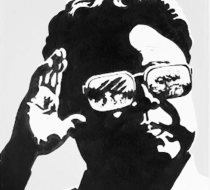Sun Mu: From Propaganda to Protest Favorite
"Sun Mu is not the artist’s actual name. It’s a nom de plume that uses a combination of two Korean words that translate to ‘The Absence of Borders’. It not only represents what he feels is the transcendence of art but also the literal military demarcation line that keeps the Korean people separated.
Sun Mu, who was trained to create posters and murals for the Communist government, is the first defector from the North to have won fame as a painter in the South by applying that same style of propaganda to biting parodies of the North Korean regime. His exhibition in 2007 brought the artist international recognition and he has since been invited to show his work at galleries around the world. Sun Mu often depicts images of Kim Jong-Il and Kim Il-Sung, a subject considered sacred which only a few artists are authorised to paint. However, Sun Mu’s depictions of the Kims are unlike any official portraits you would see created under the regime. The artist paints Kim Jong-Il not in his trademark Mao outfit, but instead in sports gear like a Nike jacket or Adidas track pants.
He escaped in 1998, fleeing a devastating famine that killed an estimated 330,000 people, seeking refuge in South Korea. There, the artist began painting once again, except now using his talents to forge blistering critiques of the regime for which he once worked.
His artwork evokes the painting and composition styles of self-glorifying regime art—which often represent leaders as god-like figures exercising extreme military might—but it depicts scenes of servile subjugation and absurd portraits of North Korean despots instead. Symbols of capitalist America pervade his portrayals of life in North Korea—a rosy-cheeked baby sips a Coca-Cola, a schoolgirl clutches a Starbucks cup, Mickey Mouse ears crown the head of Kim Jong-un—demonstrating the complicated geopolitics that govern the ideological landscape of North Korea. The subjects illustrated in his posters wear smiles stretched so widely they communicate exhaustion rather than joy. “To me, the most important thing about work is people,” Sun Mu says . “I always…try to figure out what it means [to live] life as a human."







